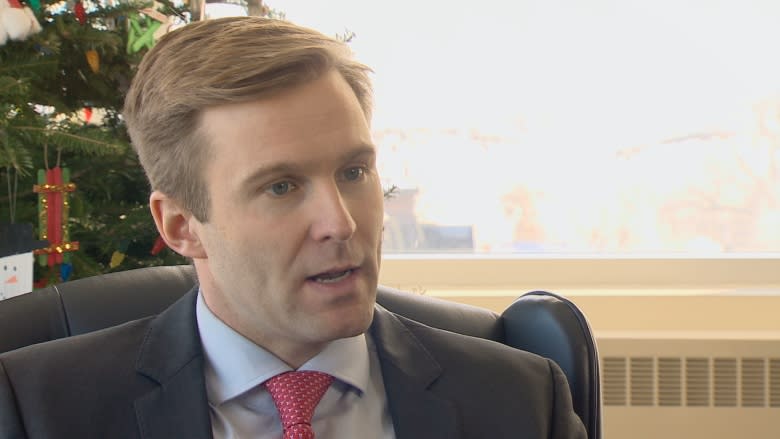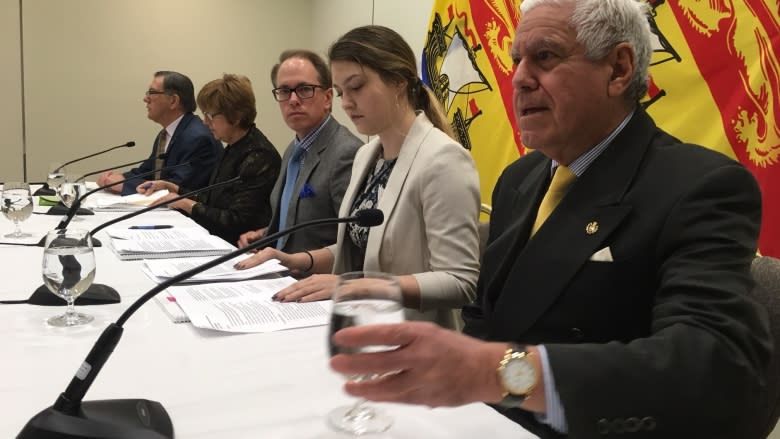Premier Brian Gallant puts brakes on electoral reform recommendation
Premier Brian Gallant is saying no to a speedy embrace of a new balloting system in New Brunswick elections.
Scarcely an hour after an independent commission recommended the adoption of a preferential balloting system in time for the next election, Gallant slammed on the brakes.
He said he doesn't think the voting system should change without voters having a say first.
"To change the way people vote we think is a fundamental change," Gallant said. "So we would have to have a clear mandate. Any government would have to have a clear mandate to make that change.
"A mandate could be sought through a referendum. A mandate could be sought through a political party's platform in an election."
Considers vote before next election
But Gallant didn't rule out asking New Brunswickers to vote on the idea before the next election, either.
The commission's report, released Friday morning, said a preferential ballot would lead to a legislature that is more representative of what diverse voters want.
Under a preferential ballot, voters could choose to rank their preferred candidates.
In a first round of counting, only first choices would be tallied. If no candidate got more than 50 per cent, the last candidate would be dropped, and the second choices on ballots cast for him or her would be added to the totals of the remaining candidates.
That would continue until a candidate reached 50 per cent.
A preferential ballot "is a modest, pragmatic choice for reform that does not create its own series of problems, as a wholesale change to another electoral system would," the report says.
"It also keeps things simple and easy, so that everyone can understand how to vote and that their vote really counts."
The commission said it would also deter candidates from attacking each other because each candidate would be looking to become the second choice of voters supporting other candidates.
Fundamental shift
Members did not take a stand on whether the change should be put to a referendum.
But Gallant called it a "fundamental shift" that should require voter approval.
The premier wouldn't rule out holding a referendum before the September 2018 campaign.
"We still have a year and a half before the next election," he said.
Commission member Bev Harrison said his view was that referendums are obstacles to change.
"We do elect governments to make decisions," he said. "A referendum cannot only be divisive but it doesn't really tell you anything."
Harrison also disagreed with critics who have said a preferential ballot would favour the Liberals.
"Every election is different. You can't put those parameters in place that say, 'it's automatically going to favour the party in the centre.' … Each election is fought on its own merits."
The commission said New Brunswick's existing first-past-the-post system "can result in a legislature that fails to reflect accurately the diversity of opinion in the province." Parties often win a majority of seats without winning a majority of the popular vote.
Lowering voting age
Another major recommendation in the report is lowering the voting age and the age limit for being a candidate from 18 years to 16 years.
It says people who get involved in politics at a young age are more likely to stay involved, and it rejects the idea that 16-year-olds are too young to vote.
"The commission was encouraged by the level of maturity and intelligence displayed by the young New Brunswickers with whom it met," the report says.
Gallant says that's not "as major a change" and probably wouldn't need a referendum or electoral mandate to implement.
But he said it would have a "significant impact on the number of people who would be allowed to vote" so the government would have to study whether to do it.
The report rejects another popular innovation that it was urged to adopt: electronic voting. It says it's still not clear the anonymity of voters can be protected.
Opposition in support
Green Party Leader David Coon said he was happy to see the report reflect two ideas he has pushed: an eventual phasing out of corporate and union donations to political parties and allowing 16-year-olds to vote.
He said a preferential ballot system falls short of a proportional representation model, which allocates seats to parties based on the percentage of votes they receive.
In a written statement, Progressive Conservative Party Leader Blaine Higgs applauded the recommendation that the government bring back a law he brought in that requires parties to provide detailed costings of their election promises.
Gallant's government repealed that law.
Rosaire L'Italien, the interim NDP leader, called the preferential ballot idea "the most ridiculous thing the New Brunswick government has done since making our license plates read 'Be ... In This Place.'"
He said there was a clear consensus in public consultations for proportional representation.
People's Alliance Leader Kris Austin said the preferential ballot would help smaller parties like his.
Austin, who lost his bid for a seat in 2014 by 26 votes, said he was probably the second choice of many voters. "I hear people so often saying, 'I'd vote for you but what's the point?'"
But Austin said he doesn't support lowering the voting age to 16 because 18 is the age when people are considered adults.
Other recommendations include:
- Creating a temporary financial incentive for political parties that nominate more women candidates.
- Allowing non-citizens who are permanent residents to vote in provincial and municipal elections.
- Teaching more about government, politics and voting in the school system.
- Moving the fixed date for provincial elections from the fourth Monday in September to the third Monday in October. That would avoid university and college students new to the province being excluded by a rule that says a voter must live here for 40 days before they can vote.





